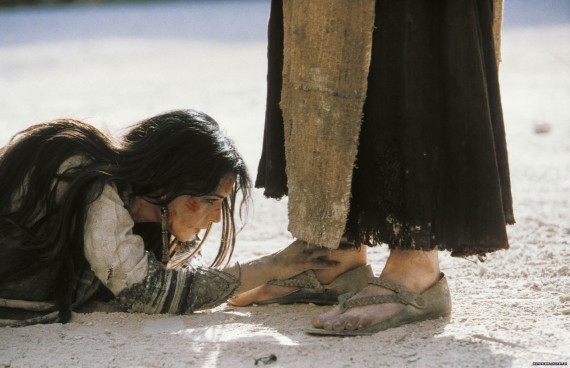Ever wonder what Jesus meant when He said “The Kingdom of God is at hand”?
THIS:
Liberating you from bad ideas about God
Stop relying on pastors and Bible teachers to tell you what the Bible means.
Read this book and learn to study the Bible for yourself. Available now on Amazon.
The book discussion questions with each chapter to make it perfect for a home study group. There is also a LONG appendix on how to understand the violent passages in Scripture.
Ever wonder what Jesus meant when He said “The Kingdom of God is at hand”?
THIS:
 A reader recently sent in this astute question:
A reader recently sent in this astute question:
Why does Jesus tell people to “Go and sin no more” when He knew it was basically impossible for them to stop sinning?
This is a great question, and one that has been cropping up a lot in the comments on this blog recently. For example, check out some of the comments in my post about “How do I stop sinning?”
Before I attempt to answer this important question about what Jesus means when He says “go and sin no more,” let me state two disclaimers.
Yes, I know that Scripture contains numerous passages which seem to teach that sinless perfectionism is possible in this life (cf. Matt 5:48; 1 John 3:4-10). So please … don’t leave a comment below quoting all the text in the Bible which you think I haven’t read. I have read them, studied them, and believe them. I simply have a different understanding of those texts than you do.
Second, just because I believe the Bible teaches that it is not possible in this life to go and sin no more at all ever again in any way, this is not at all the same thing as telling people to go sin all they want. I believe that Christians can and should stop sinning, but I approach the issue of sin differently than often encountered elsewhere. I think the primary reason God wants us to stop sinning is not because it offends Him, but because sin damages us.
There are two times in the Gospels when Jesus tells people to “go and sin no more.” One is after Jesus healed the man by the Pool of Bethesda (John 5:14) and the other is after He rescued the woman caught in adultery from getting stoned to death (John 8:11).
What is strange about the instance with the man by the Pool of Bethesda is that the text mentions no sin which had led to his condition. The text simply says he had been there for 38 years (John 5:5). We aren’t told why. We aren’t told what happened. Though most commentators say that the man must have sinned in some way to cause his condition, the text says nothing of the sort.
Bible scholars say, “Well, it must have been some sort of sin which led to the man’s condition, or else why would Jesus say, ‘Go and sin no more or else something worse will happen to you’?”
Really? I have major problems with this. First, if the man had been invalid for 38 years, how old could he have been when he committed this terrible sin which caused God to strike him down as an invalid for the next four decades? I mean, what sort of terrible sin had this child from 38 years ago (or possibly a teenager) committed, which would cause God to punish him in such a terrible way?
And then, Jesus comes along and say, “Now don’t do that again, or I’ll have to punish you even worse!”
Does that sound anything like Jesus? Not the Jesus I know. I don’t think that sin led to this man being an invalid for 38 years, and I definitely don’t think that Jesus was threatening this poor man with some greater punishment if he committed that sin again.
So how then are we to understand Jesus’ statement, “Go and sin no more”?
Well, notice that it is not in the context of healing the man from being an invalid that Jesus says “Go and sin no more.” It is in the context of the religious leaders threatening the man’s life because he had the audacity to carry his bedroll on the Sabbath (John 5:10). Why do I say there were threating his life? I believe there is a parallel in John 5 with something that happens in Numbers 15:32-35.
There, man is caught picking up sticks on the Sabbath, so they arrest him and take him to Moses, who consults God on the matter. God (apparently) tells Moses that the community should stone the man for the high crime of picking up sticks on the Sabbath.
So when Jesus tells the man “Go and sin no more or else something worse might happen to you,” I think he says it with a sparkle in His eye, some satire in His voice, and a head nod toward the disapproving and judgmental religious leaders.
Essentially Jesus tells the man (read the following with soft sarcasm): “Oh no! You carried your bedroll on the Sabbath! How could you do such a terrible thing! You sinner! Stop it! If you don’t, they’re going to have your head.”
Of course, although Jesus was speaking to the man with satirical humor, the situation was deadly serious as well, and Jesus knew it. It was true that if the man was not careful, the religious leaders would try to kill him simply because he carried his bedroll on the Sabbath. In fact, in the very next verses, their murderous rage gets redirected toward Jesus because He is the one who told the man to carry His bedroll (John 5:15-18). The text says they sought for a way to kill Jesus. The “something worse” which was going to happen to the man is now directed toward Jesus.
So was Jesus telling the man to “Go and sin no more”? Well … yes, but it is more like this: “Go and ‘sin’ no more, or the sin police over there are going to kill you.”
That’s how I read John 5:15-18.
Based on this, you can probably predict how I understand John 8:1-11.
I think John included this incident in his Gospel just a few chapters after the “grievous sin of bedroll-carrying incident” because unlike the carrying of the bedroll on the Sabbath, the woman in this event was truly sinning. She was caught in the act of adultery.
 The religious leaders are about to stone her to death when Jesus shows up, scribbles in the sand, and when no one is left to condemn her, tells her to “Go and sin no more.”
The religious leaders are about to stone her to death when Jesus shows up, scribbles in the sand, and when no one is left to condemn her, tells her to “Go and sin no more.”
Most commentators note the connection here with the Levitical law that the punishment for adultery was death by stoning (Lev 20:10; Deut 22:22). Most commentators also point that the Levitical law required that both the man and the woman are to be stoned, but in John 8, only the woman is present. This was not because the religious leaders didn’t know who the man was, for they had caught the woman in the very act of adultery. Where is the man? We do not know.
There is some speculation that this woman was simply the innocent bystander in a malevolent plan by the religious leaders to accuse and attack Jesus (John 8:6). Since John 5:1-18, the religious leaders had been looking for ways to discredit and kill Jesus, and they had now found (or created?) a way in this poor woman. Could it be that her guilty partner was involved in the scheme himself?
It is likely that the woman was actually a prostitute, and the religious leaders saw this situation as a “win-win” opportunity for them. If Jesus did not defend her, then they got to stone a prostitute. Yay! If Jesus did defend her, then they could stone Him too as a bonus.
The plan, of course, didn’t go as expected, and Jesus wrote something in the sand which caused all the men to slink away. We don’t know what He wrote, though there is endless speculation about it might have been.
Anyway, once they have all left, Jesus tells the woman that He does not condemn her (and He is the only one present who could have!), and that she should “Go and sin no more.”
Why? For the same reason Jesus told the man in John 5 to go and sin no more: because the religious leaders were out to get her. Now that they had been rebuffed by Jesus and their righteous activity of stoning a prostitute had been denied them for the day, they would doubtless begin looking for a way to kill her again.
 Basically, Jesus is saying, “My beautiful lady, I am sorry you got caught up in this. They were after me; not you. They framed you to get at me. I want to protect you from them, so please, consider leaving your current profession. They are likely going to seek to frame you again, and the next time, they won’t bring you to me. They’ll just kill you. Neither one of us want that, so go … do something different with your life.”
Basically, Jesus is saying, “My beautiful lady, I am sorry you got caught up in this. They were after me; not you. They framed you to get at me. I want to protect you from them, so please, consider leaving your current profession. They are likely going to seek to frame you again, and the next time, they won’t bring you to me. They’ll just kill you. Neither one of us want that, so go … do something different with your life.”
Clearly, Jesus did not mean that the woman should never sin again in any way whatsoever. He knew, and we know, that this is impossible. He was simply warning her about the danger of continuing in her current lifestyle.
So what does this way of reading these texts say to you and me? Several things.
First, please, please, please … don’t be a religious jackass. If Jesus is the only one who has the right to condemn and judge a person, but He chooses not to (cf. John 8:11, 15), then we all better think twice (and thrice!) before we cast the first stone. Don’t call for people’s jobs, or pray for their house to burn down, or tell them that because of their lifestyle they are headed for hell.
Such behavior looks less like Jesus and more like the religious leaders who sought to kill Jesus.
Second, recognize what sin is (and isn’t). Sin damages our relationship with God and with one another. Sin destroys our lives and causes emotional, financial, physical, spiritual, and psychological harm. The reason God wants us to stop sinning is simply because God wants what is best for us, and sin does not result in God’s best.
Our sin doesn’t cause God to turn away from us, reject us, hate us, or cast us out. Our sin grieves God because He knows how much sin hurts us, and as our loving Father, He doesn’t want us to get hurt.
God doesn’t care about our sin; He cares about us — which is why He wants to help us not sin.
Finally, as I’ve said before, we stop sinning not by trying to stop sinning, but by walking with Jesus and inviting God into the dark places of our life. When a room is dark, you don’t chase away the darkness by talking against it, praying against it, and commanding the darkness to leave. No, darkness naturally recedes when light enters the room. You want to stop sinning? Invite God into it, and watch the light of His love cast out all sin.
What type of work is too sinful for a Christian? Where do you draw the line on sinful employment?

Take this quick survey and use the share buttons at the bottom of the post to invite your friends to take the survey too. I will share the results of this survey in a later post. Thanks!
I had an interesting conversation recently with a man who attends a local mega church. Well, the church is about 1000 people, so it’s not quite “mega” (Which I think is defined as 2,000+ in attendance).
He was challenging my decision to follow Jesus outside the four walls of the church building, and had the usual objections:
Him: Why would you leave Christ’s church?
Me: I didn’t leave it. I just practice church differently than you do.
Him: But how do you use your spiritual gifts?
Me: In a multitude of ways, none of which require my butt to be in a pew on Sunday morning.
Him: But Christians are to live in community. Where is your community?
Me: First, church attendance does not necessarily equal community, but second, I live in deep community with other people like myself who also do not sit in pews on Sunday morning.
Anyway, the conversation went on like this for some time. At one point though, he said this:
Him: But you could be accomplishing so much more for the Kingdom of God if you were part of a large group of people. Sure, your small community can accomplish a few small things, but imagine if you were all working together with thousands of others! Your work would be multiplied! You would see exponential growth!
I told him it was a good point, and one that I would consider.

I have since considered his point … and I would like your input on how you might respond to such a question. Here are my points. What can you add?
First, I have great trouble with this mindset that only big things are worthwhile.
Jesus constantly modeled that the small things, the unimportant people, the little children, the cup of cold water, the tiny mustard seed, the one act of faith, the shameful, the foolish, and the insignificant, … these are the things that mattered to God and where God was most at work.
Sure, Jesus performed some large-scale miracles, but it seems that as Jesus progressed in His ministry, He went smaller and smaller; not larger and larger. If Jesus had wanted to, He could have had thousands of followers at His back after 3 years of ministry. But this is not what He wanted. …So why is this what we want?
Even Jesus’ parable of the tiny mustard seed shows this. It is not uncommon to hear pastors say, “See? This church started as a tiny little group of people meeting in my living room. But now, it is thousands of people with a multi-million dollar budget. The tiny mustard seed has grown into a giant tree!”
It sounds good, but it’s plain wrong. Yes, the tiny mustard seed grows into a large tree so that even the birds can sit in its branches, but if we ever say our particular church or ministry is “the large tree” we have completely misunderstood what Jesus was saying.

What grows into a large tree? The Kingdom of God does … not my little corner of it. No matter how large we become, our part in the Kingdom will always be small.
Here is often how these comparisons go:
You and your small group did a good thing there helping that poor family in town pay their rent this month. But at our church, we raised enough money to build an entire orphanage in Africa and staff it for an entire year!
Sure, you’re small group of six people spent $300 to help that family, but if you could have joined that money with the $250,000 raised by our church this year to build that orphanage, imagine how your investment in the Kingdom would have multiplied!
Initially, such a comparison sounds compelling. It’s true … helping one family pay rent for one month does not sound as impressive as building and staffing an African orphanage to help rescue, feed, and teach orphans for a year.
But if you begin to crunch the numbers, things look quite different. If 6 people raised $300 in one month to help one family, then this comes to about $50 per person per month. Who’s to say they won’t do something similar next month? And the month after that? Over the course of one year, this is about $600 per person.
Meanwhile, if you take the $250,000 that church raised for the orphanage, and divide it between the 1000 people in the church, this comes to $250 per person.
Obviously, I’m just making these numbers up, but this is how these ministry comparison’s are often done. The tiny little ministry a small group does for a local need is compared with some giant project that a large group does for some other (usually foreign) ministry. But if you really start to compare apples to apples, you will almost always find that the small groups are more generous.
But what about what is accomplished? Isn’t that important? Yeah, let’s talk about that?
Here is the main concern I have with big ministry projects done by big churches. Usually (but not always!), because of the large scale of the project, there is relatively little personal interaction between the “givers” and the “receivers.”
Instead of six people helping out a family across the street, whose names are known, whose needs are obvious, and where relationships can get developed, 2,000 people give money into a giant pot to help a nameless “need” in some other part of town or across the country. Then, after administrative costs and overhead are deducted out of the money that comes in, a team of people goes out to perform the ministry to the massive group whose “need” is trying to be met.
But because the ministry team has to meet the “need” of such a large group of people, there is very little opportunity to get to know the people. Very little relationship building is accomplished.
Sure, bellies are filled, buildings are raised, classes are taught, and books are distributed, but how many long-term relationships were built? How many names were learned? How many conversations were had?
I sometimes think that the way some churches define ministry is not always identical to the way Jesus defines ministry.
If you write a check for $500 to help build an orphanage in Africa … but don’t know your neighbor’s first name, what good is it?
If you attend every mission’s conference your church hosts, but have never learned about the marital problems of your coworker, what good is it?
If you know your Bible forward and backward and memorize 365 verses a year, but don’t know the names of the children on your street, what good is it?
Look, everybody has different ministries and different goals, but I just get tired of having to defend small, one-on-one, loving-my-neighbor ministry to people who think that the only true ministry is one that costs hundreds of thousands of dollars, involved thousands of people, and takes place on another continent.
Ministry does not become more spiritual when it is baptized in salt water (when it takes place across the sea).
If you are not loving your neighbors right now, you cannot write a big check and call it “ministry.”
Okay… so you can weigh in below. Have you ever encountered this “Go big or go home” mentality when it comes to ministry, and that small groups of believers would be wiser to pool their time and resources with large churches so that their ministry effectiveness can be multiplied? If so, how do you respond?
Have you considered that Jesus may be leading you to leave the church as you know it so that you can be the church as it was meant to be?
Please don’t dismiss such an idea too quickly.

There are lots of people who leave the church today, and they often get criticized for abandoning God or disowning Jesus. But in my experience, I don’t find this at all. I find that people who “leave the church” have not given up on God or stopped following Jesus. Instead, many of them are simply learning to follow Jesus outside the four walls of a church building. They are seeking to be the church by following Jesus into the world.
So let me encourage you … if you find a rapidly growing unrest with church as it has always been done, this unrest may come from Jesus.
Millions of people today know that something is missing from their normal church experience, and they sense Jesus leading them to something more, but they don’t know what …
Some Christians think Jesus is leading them to leave the church they are in to start attending a different church down the street. More often than not, they get to this new church, and find that the internal unrest has followed them to the new building. So they start looking for a new church to attend, or think that maybe they misunderstood God’s leading.
Some Christians think Jesus is leading them to leave the church they are in so they can go on a mission’s trip to Africa. So they raise funds, pack bags, and spend $10,000 for a six-week trip to Africa. And while they might have a spiritual mountaintop experience while there, they find that the internal unrest followed them to the new continent, and is multiplied even more once they return.
Some Christians think Jesus is leading them to leave the church they are in so they can go to seminary and become a pastor or church leader. They have ideas for how the church could be different, better, more productive, and believe God wants to do new things in His church through their ministry. But in the process, they get saddled with a bunch of debt and end up leading a church which is almost identical to every other church in the country.
Some Christians think Jesus is leading them to leave the church they are in so they can follow “the New Testament pattern” and get involved in a home church or community collective. They long for that intimate setting where everybody has everything in common, where people get to share as the Spirit leads, and where there are no professional clergy, choirs, or classes. But they soon find that although the setting might be smaller, home churches are not that much different than regular churches.
Some Christians go through some (or all) of the experiences described above, and think that the unrest they feel is because church is simply a waste of time and energy, and so they leave the church … and Jesus too. They turn their back on all of it, saying that they tried the whole “church thing” and it wasn’t for them.
If you want Jesus to lead your life, I can pretty much guarantee you have gone through one or more of the experiences above. I have personally experienced all of the scenarios above, other than that last one.
So are these experiences wrong? Was that feeling of unrest not from Jesus after all, but from some self-centered desire to experience something new, do something adventuresome, or fulfill an unmet need?
 I say no.
I say no.
I firmly believe that when people feel that Jesus is calling them to leave the church they are in, they are rightly discerning what Jesus is saying through the indwelling Holy Spirit.
The problem, however, is that when people feel Jesus calling them to leave the church they are in, along with this leading, they want to know where Jesus is calling them to go. But very rarely does Jesus offer this direction. If Jesus says, “Leave” and we say, “Okay … but to where?” Jesus will answer with “Just leave.”
The mistake is when we try to fill in the blank ourselves and say, “Well, I can’t just leave the church. So I guess I’ll go to another church. Or go to Africa. Or attend seminary. Or start a house church.” But Jesus never led us to those places, and so after going to these places where He never led, we will soon have that feeling of unrest again, and we will wonder if we misunderstood or misheard Jesus.
You didn’t misunderstand or mishear. But now Jesus has to call you to leave the church all over again.
Do you want to know where Jesus is leading you? Jesus is leading you to leave the church “as you know it” so that He can guide you into being the church “as He wants it.”
The church Jesus wants has little to do with the things that are often identified as “church.” The church Jesus wants has little to do with fundraising, mission’s trips, attendance numbers, ministry programs, large-group events, personality cults, best-selling authors, TV and radio programs, stained-glass windows, padded pews, professional choirs, or regularly scheduled Bible studies.
Instead, the church Jesus wants has everything to do with personally loving our neighbors, hanging out with “sinners,” spending time with societal rejects, defending the cause of the weak, and a variety of other ways of living that look just like Jesus. But you will never learn to be the church Jesus wants until you take the step of faith to leave the church that you want.
Do you feel a growing unrest or dissatisfaction with the church? That’s not wrong. That’s Jesus calling you to leave the church. Will you follow?
P.S. Please note this: I am not telling you that Jesus is calling you to leave the church you are in. If you sense no such leading from Jesus, then stay put!
